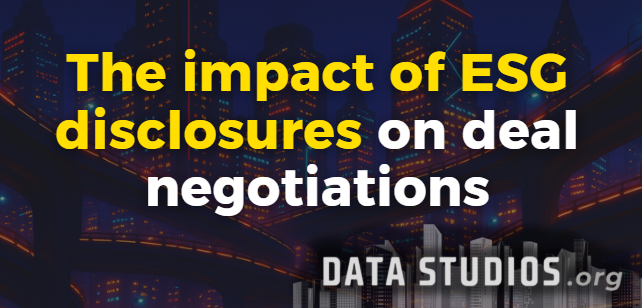The impact of ESG disclosures on deal negotiations
- Graziano Stefanelli
- Aug 29, 2025
- 3 min read

Environmental, Social, and Governance (ESG) factors have become central considerations in mergers and acquisitions (M&A). Investors, regulators, and stakeholders increasingly evaluate companies based on sustainability, social responsibility, and governance practices. As a result, ESG disclosures—covering carbon emissions, labor practices, diversity policies, data privacy, and corporate governance—play a growing role in deal valuation, due diligence, and negotiations. Failure to address ESG risks can reduce transaction value, delay regulatory approvals, and expose buyers and sellers to reputational and financial consequences.
ESG considerations now influence transaction pricing and deal structure.
As ESG priorities rise, dealmakers incorporate sustainability-related risks and opportunities into pricing decisions:
Premiums for strong ESG performance → Companies with high ESG ratings often command higher valuations, particularly in industries like energy, technology, and consumer goods.
Discounts for ESG weaknesses → Businesses with regulatory violations, poor governance, or environmental liabilities face lower offers or earn-out-based deal structures.
Greater scrutiny in sensitive sectors → Deals involving natural resources, labor-intensive manufacturing, and data privacy are now evaluated more closely by both regulators and investors.
By quantifying ESG-related risks, buyers and sellers are increasingly able to adjust purchase price allocations and tailor integration strategies to reflect potential compliance costs.
ESG disclosures are reshaping due diligence processes.
Traditional financial and operational due diligence is now expanded to include ESG-focused assessments. Buyers evaluate targets on three main dimensions:
ESG Dimension | Due Diligence Focus | Impact on Transactions |
Environmental | Carbon footprint, energy usage, waste management | Influences valuation in sectors with emissions exposure |
Social | Labor standards, workforce diversity, community impact | Affects brand perception and employee retention |
Governance | Board structure, executive compensation, shareholder rights | Impacts trust, litigation risk, and investor alignment |
Failing to disclose ESG-related issues—such as pending environmental fines or supply chain controversies—can lead to renegotiated deal terms or post-closing liabilities.
Regulatory requirements drive transparency and compliance.
Governments and market authorities are tightening ESG disclosure rules, increasing pressure on companies involved in M&A:
European Union → The Corporate Sustainability Reporting Directive (CSRD) expands mandatory ESG disclosures for thousands of companies by 2026.
United States → The SEC has introduced proposed rules requiring public companies to report climate-related financial risks and emissions metrics.
Asia-Pacific → Markets like Singapore, Japan, and Hong Kong require ESG frameworks for listed companies, influencing cross-border approvals.
These regulations affect deal timelines and integration planning. Buyers acquiring companies in strictly regulated jurisdictions must ensure compliance to avoid regulatory penalties or forced divestitures.
ESG liabilities can create hidden financial exposure.
Incomplete ESG disclosures can mask material risks that impact post-deal economics:
Environmental remediation costs from legacy contamination or regulatory violations
Labor disputes related to unsafe working conditions or diversity gaps
Cybersecurity breaches linked to insufficient governance on data protection
Supply chain vulnerabilities in industries exposed to forced labor or unsustainable sourcing
Failure to identify these issues during due diligence can result in unexpected fines, operational disruptions, or reputational damage after the transaction closes.
Investors and lenders integrate ESG into financing conditions.
ESG performance now affects not only deal pricing but also acquisition financing terms. Lenders, private equity sponsors, and institutional investors increasingly link access to capital and loan pricing to sustainability factors:
Green financing facilities → Lower-cost capital available for ESG-aligned targets.
ESG-linked covenants → Credit agreements tied to emissions targets, diversity goals, or compliance reporting.
Investor preference → Funds managing ESG mandates prioritize companies with strong sustainability records, enhancing demand and valuations.
Buyers seeking to finance acquisitions in sectors under environmental or social scrutiny must demonstrate robust ESG risk management strategies to secure favorable terms.
Integration strategies must address ESG alignment.
Post-deal success increasingly depends on harmonizing ESG practices across buyer and target operations:
Standardizing reporting frameworks → Unifying sustainability metrics to meet investor and regulatory expectations.
Enhancing workforce policies → Aligning diversity, safety, and employee engagement programs.
Mitigating operational risks → Closing compliance gaps in areas like emissions tracking or supply chain sourcing.
Strengthening governance → Adopting consistent policies on board independence, executive pay, and shareholder protections.
Failure to address ESG integration early can undermine anticipated synergies and create investor dissatisfaction.
ESG-driven negotiations shape the future of dealmaking.
In today’s M&A environment, ESG factors are no longer secondary—they are material drivers of value, risk, and competitive positioning. Strong disclosures can attract premium bids, enhance financing options, and accelerate regulatory approvals, while poor ESG performance can deter acquirers and trigger price reductions.
Companies preparing for a sale or acquisition must strengthen their ESG reporting, manage sustainability-related risks proactively, and incorporate these considerations into deal models, governance frameworks, and integration planning.
____________
FOLLOW US FOR MORE.
DATA STUDIOS




